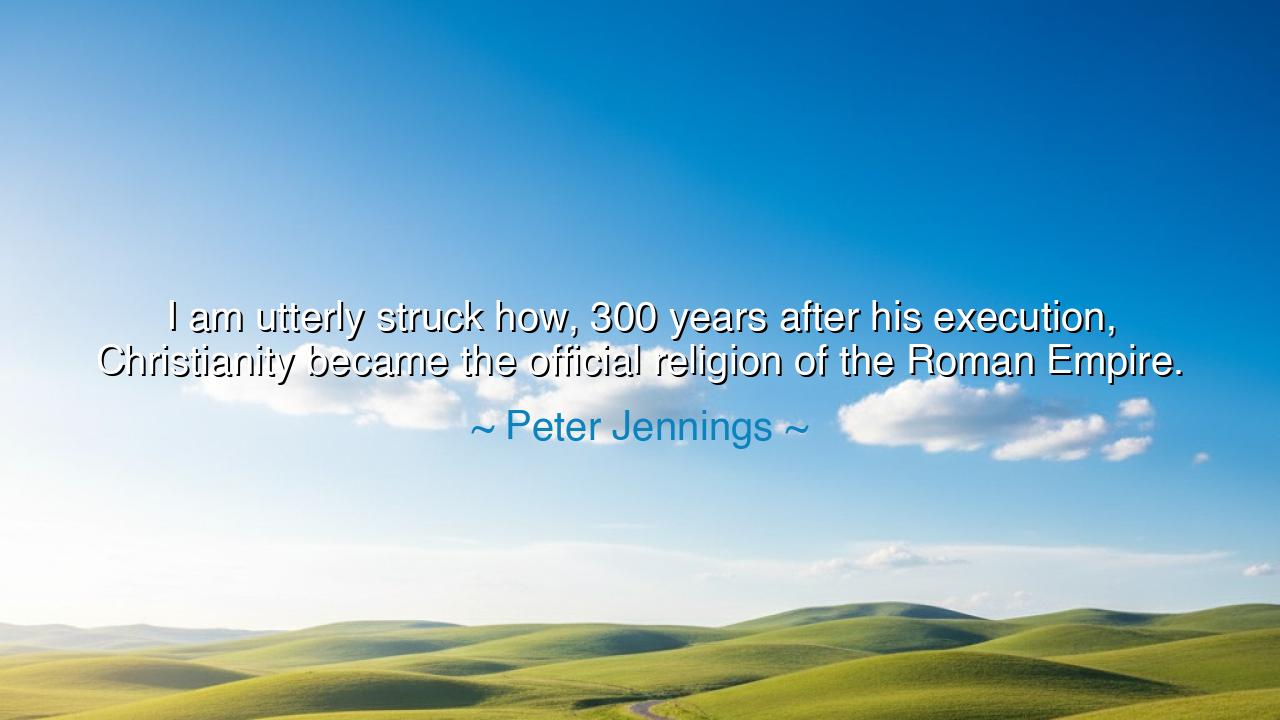
I am utterly struck how, 300 years after his execution
I am utterly struck how, 300 years after his execution, Christianity became the official religion of the Roman Empire.






Peter Jennings, a seeker of truth among the chronicles of history, declared with awe: “I am utterly struck how, 300 years after his execution, Christianity became the official religion of the Roman Empire.” These words ring with astonishment, for they point to one of the greatest reversals in all the annals of mankind: the faith of a crucified carpenter, once despised and crushed under imperial power, rose to sit upon the very throne of the Caesars. What greater testimony is there to the endurance of spirit, to the triumph of conviction over the sword, to the victory of the eternal over the temporal?
In the beginning, the followers of Christ were but a small band, scattered and trembling. Their leader had been executed in disgrace, condemned as a criminal, abandoned by the powerful. To the Roman eye, Christianity was folly, weakness, a superstition fit only for slaves and outcasts. Yet within this seeming weakness burned a fire that no empire could extinguish. Men and women met in secret, in catacombs and hidden houses, whispering prayers, breaking bread, and refusing to bow before idols. Persecuted, hunted, thrown to lions, yet they endured—and their endurance was the seed of greatness.
Consider the story of Perpetua, a young noblewoman of Carthage. Arrested for her faith in the year 203, she stood before the Roman governor, her infant child in her arms. When ordered to renounce her Christ, she refused. Cast into the arena, she faced the beasts with unshaken courage, her spirit unbroken even in death. Her witness, like countless others, shone brighter than fear. The empire spilled the blood of martyrs, but in doing so, it watered the soil from which the faith would grow. Truly, as the ancients said, the blood of the martyrs became the seed of the church.
And then came the great turning of the tide. Three centuries after the crucifixion, Constantine, emperor of Rome, looked to the heavens before battle and saw a sign—a cross, with the words: In this sign, conquer. He marched under that banner and claimed victory, and soon after, he decreed tolerance for the faith that once had been outlawed. What Jennings marvels at is not only the speed of this transformation but the miracle itself: what once was despised became exalted, what once was hunted became enthroned. From the ashes of persecution arose the glory of a religion that would shape the world for millennia.
But, O listener, let us not be blinded only by triumph. With power came both opportunity and peril. The same Christianity that once stood against empire now found itself joined to it, forever changed by the embrace of Caesar. Here lies another lesson: that the strength of a movement is not only in its victories, but in how it wields them. Faith that survives oppression proves its purity; faith that survives power proves its wisdom. The story Jennings recalls is both heroic and cautionary, a tale of endurance and transformation.
The meaning is clear: truth, once planted in the hearts of men, cannot be killed by the sword. Empires rise and fall, but ideas endure. The crucifixion was meant to end a movement; instead, it gave birth to a force that reshaped the world. If such a reversal could happen in three centuries, what then might be possible in your life, or in the life of your generation, if you hold fast to conviction with courage?
Practical wisdom flows from this: do not be discouraged when your cause is small, or mocked, or despised. Great movements often begin in weakness. Nurture your convictions with patience, endure trials with faith, and believe that time itself may turn in your favor. Remember the martyrs who stood unshaken, and remember Constantine who, against all expectation, lifted their banner above the empire. In your own battles, hold fast to what is true, for truth has a power that even the mightiest rulers cannot overthrow.
So let this be the inheritance of your soul: from the cross to the crown, from persecution to power, from ashes to empire, the story of Christianity’s rise proves that no cause rooted in love, faith, and endurance can ever truly be destroyed. Let this truth embolden you: though today you may seem small and forgotten, tomorrow you may stand as the cornerstone of history. For the world is ever turning, and the fire of conviction, once lit, can outlast empires.






AAdministratorAdministrator
Welcome, honored guests. Please leave a comment, we will respond soon